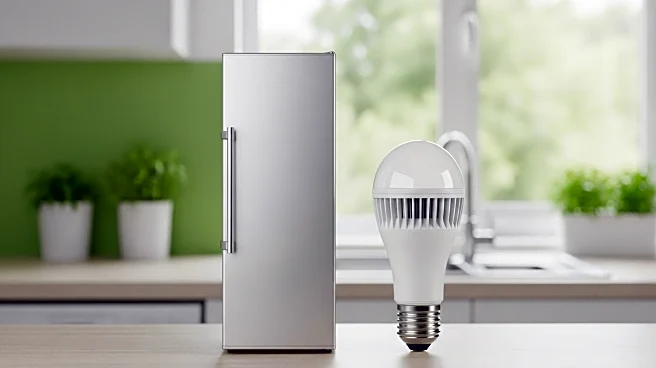What's Happening?
The energy efficiency advocacy group CLASP has released a report emphasizing the need for a significant increase in the global annual rate of improvement in energy efficiency to achieve net-zero emissions by 2050. The report suggests that improvements in appliance efficiency could contribute approximately 20% of the total reduction in energy demand required to meet this goal. CLASP calls for policymakers to implement stringent minimum efficiency standards for appliances, surpassing current best practices. The report highlights a disconnect between the necessary actions and the current U.S. government stance, noting that other countries are more committed to appliance efficiency. The U.S. Department of Energy (DOE) under President Biden has estimated that stronger appliance standards could save consumers $1 trillion and reduce emissions by 2.5 billion metric tons over three decades.
Why It's Important?
The push for enhanced appliance efficiency is crucial for meeting global carbon-neutral goals, as appliances account for a significant portion of energy consumption. The U.S. government's current stance on appliance efficiency standards could impact its leadership role in global environmental efforts. If the U.S. fails to lead in this area, other countries may take the forefront, potentially affecting U.S. influence in international environmental policy. The economic implications are substantial, with potential savings for consumers and reductions in emissions. The report underscores the importance of aligning U.S. policy with global efforts to improve energy efficiency.
What's Next?
The report suggests that countries already nearing the 4% improvement rate may need only incremental shifts, while others will require transformative actions. The U.S. may need to reconsider its approach to appliance efficiency standards to align with global efforts. The DOE's pause on certain standards could be revisited, and there may be increased pressure from environmental groups and international bodies for the U.S. to enhance its efficiency standards. Manufacturers may continue to improve efficiency due to market demand, even if regulatory standards are relaxed.
Beyond the Headlines
The report highlights ethical and environmental dimensions, emphasizing the need for the U.S. to take a leadership role in global energy efficiency efforts. The potential long-term shifts include increased international collaboration and innovation in energy-efficient technologies. The report also suggests that failing to improve appliance efficiency could have broader implications for U.S. environmental policy and its role in global climate change initiatives.











